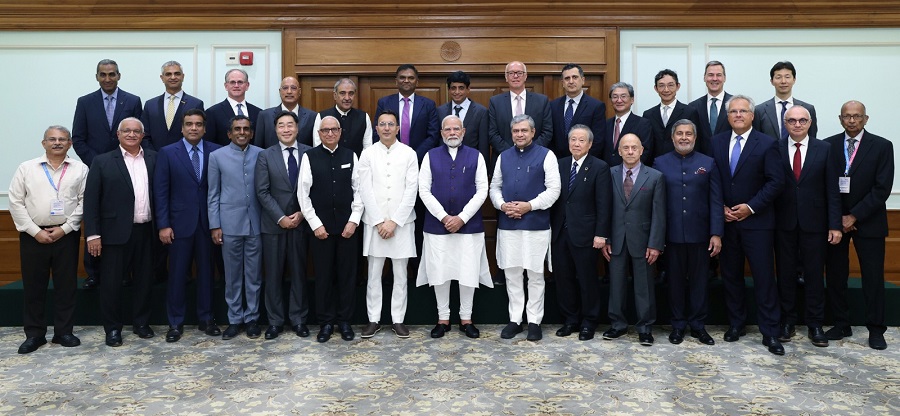Leaders Applaud India’s Role in Shaping the Future of Semiconductors
In a significant stride towards making India a central player in the global semiconductor industry, Prime Minister Narendra Modi chaired a high-level roundtable discussion today with top executives and industry leaders from across the semiconductor sector. The meeting, held at the Prime Minister’s residence at 7, Lok Kalyan Marg, was aimed at fostering deeper collaboration and accelerating India’s role in this crucial industry.

With the world rapidly moving towards a future where technology shapes everyday life, PM Modi emphasized that semiconductors are the foundation of the digital age. “The future is technology-driven, and semiconductors will soon underpin even our most basic necessities,” he said. He added that India is positioned to become a key player in the global semiconductor supply chain, offering a stable and predictable policy environment that fosters growth, innovation, and investment.
Democracy and Technology: A Formula for Global Prosperity
In his opening remarks, the Prime Minister underscored the unique convergence of democracy and technological innovation, emphasizing that the two together can uplift humanity. “India recognizes its global responsibility in the semiconductor sector, and we are committed to developing an inclusive, sustainable, and diversified supply chain,” he stated.
The Prime Minister highlighted India’s advantages: a robust talent pool, a strategic focus on skilling, and a large domestic market primed for technological infrastructure investment. “India is not only focused on building globally competitive products but also offers one of the largest markets for hi-tech infrastructure,” he added.
The Indian government, PM Modi assured, is committed to maintaining a transparent and steady policy framework, offering long-term support to the industry. With initiatives like “Make in India” and “Make for the World,” he reaffirmed the nation’s goal of becoming a trusted partner in the semiconductor value chain.
Industry Leaders Express Confidence in India’s Semiconductor Future
The roundtable included CEOs and senior executives from some of the world’s leading semiconductor companies, such as Micron, NXP, and Renesas. The global leaders unanimously praised India’s commitment to the sector, describing the current moment as “unprecedented.” They expressed optimism about India’s potential to become a global semiconductor hub, noting that the “center of gravity” for the industry is shifting towards India.
Sanjay Mehrotra, CEO of Micron, lauded PM Modi’s visionary leadership, particularly his focus on self-reliance in semiconductor manufacturing. “India’s semiconductor mission couldn’t have come at a better time, with AI and digital technologies poised for exponential growth,” he said, adding that the policy framework set by the Indian government is a catalyst for industry-wide momentum.
Ajit Manocha, CEO of SEMI, echoed these sentiments, praising the Prime Minister’s exceptional leadership. “The world is watching India, and there is no parallel to the energy and focus we see here,” he remarked.
Kurt Sievers, CEO of NXP, was particularly impressed by Modi’s deep understanding of the semiconductor industry. “It’s rare to see a leader with such expertise in this space,” Sievers said, expressing his excitement for India’s long-term potential in the semiconductor ecosystem.
From Talent to Innovation: India’s Strategic Strengths
A key focus of the discussion was India’s vast talent pool and the government’s initiatives in skilling and education, ensuring that the country can meet the demands of the semiconductor industry. The leaders also acknowledged India’s R&D potential, with the country’s focus extending beyond manufacturing to innovation and product development.
Luc Van Den Hove, CEO of IMEC, lauded India’s strategic vision, particularly in research and development. He called for a long-term partnership between India and global R&D centers, stating, “India has the potential to not only excel in semiconductor manufacturing but also lead in innovation.”
Anirudh Devgan, CEO of Cadence, further emphasized that India’s steady progress in the semiconductor space is yielding impressive results. “Every year, there is significant improvement, and it’s inspiring to witness the rise of India as a key player in the global semiconductor landscape,” he noted.
A Stable Geopolitical Climate: A Key Advantage for India
In addition to technological talent and investment incentives, executives highlighted India’s geopolitical stability as a crucial advantage. Amid a complex global geopolitical environment, India offers a secure and reliable destination for investments. Bob Pragada, CEO of Jacobs, noted, “India is poised to lead the manufacturing renaissance, and in the next decade, it could become a world leader.”
Russell C. Ellwanger, CEO of Tower, added, “The Prime Minister’s vision and execution are one of a kind. This is truly a commendable effort to elevate India’s position in the global semiconductor industry.”
A Vision for the Future: India’s Semiconductor Dream Takes Shape
The meeting concluded on a high note, with all participants expressing optimism for India’s role in shaping the future of semiconductors. They hailed the unprecedented collaboration between the Indian government and industry leaders, which has created an environment ripe for innovation, investment, and growth.
The Prime Minister’s Semiconductor Executives’ Roundtable brought together leaders from globally renowned organizations like SEMI, Micron, NXP, Renesas, IMEC, and many more, signaling India’s growing stature in the sector. Representatives from Stanford University, University of California San Diego, and IIT Bhubaneswar also attended, highlighting the important role of academic partnerships in this burgeoning field.
In closing, PM Modi reiterated India’s commitment to becoming a global semiconductor powerhouse. “This is just the beginning,” he said, “and together, we will ensure that India not only keeps pace with global technological advancements but leads the way.”
India’s semiconductor revolution is now in full swing, with industry leaders and the government united in their mission to make India a central player in the next technological era. As the global demand for semiconductors continues to rise, all eyes are on India to seize this unprecedented opportunity.







